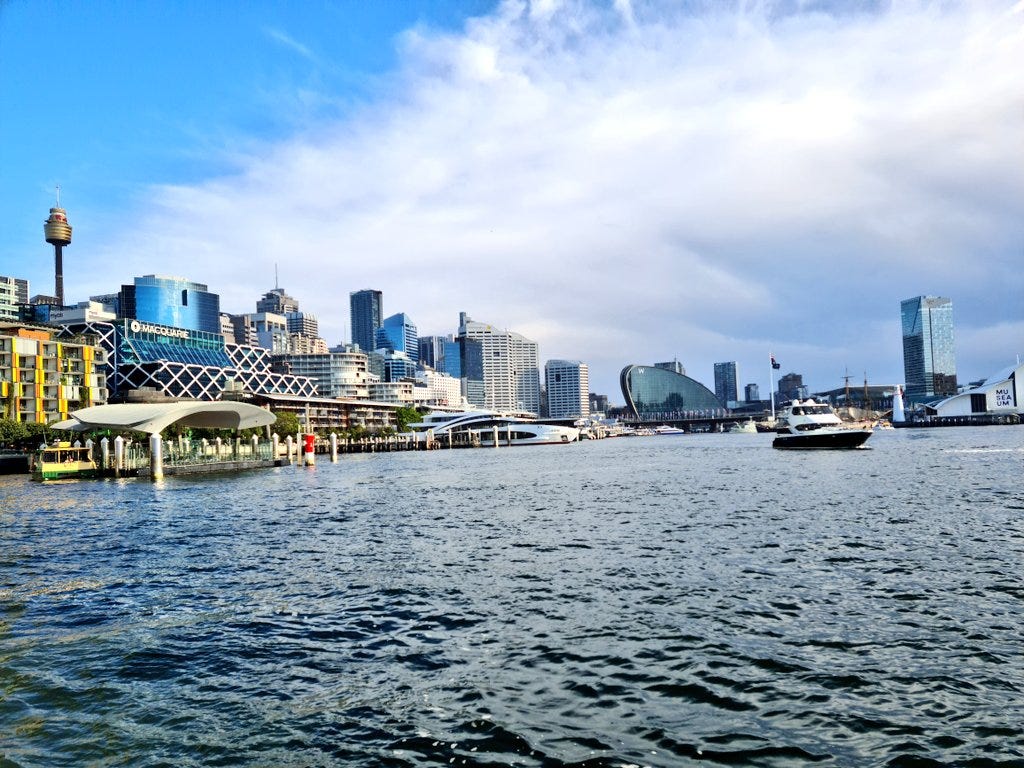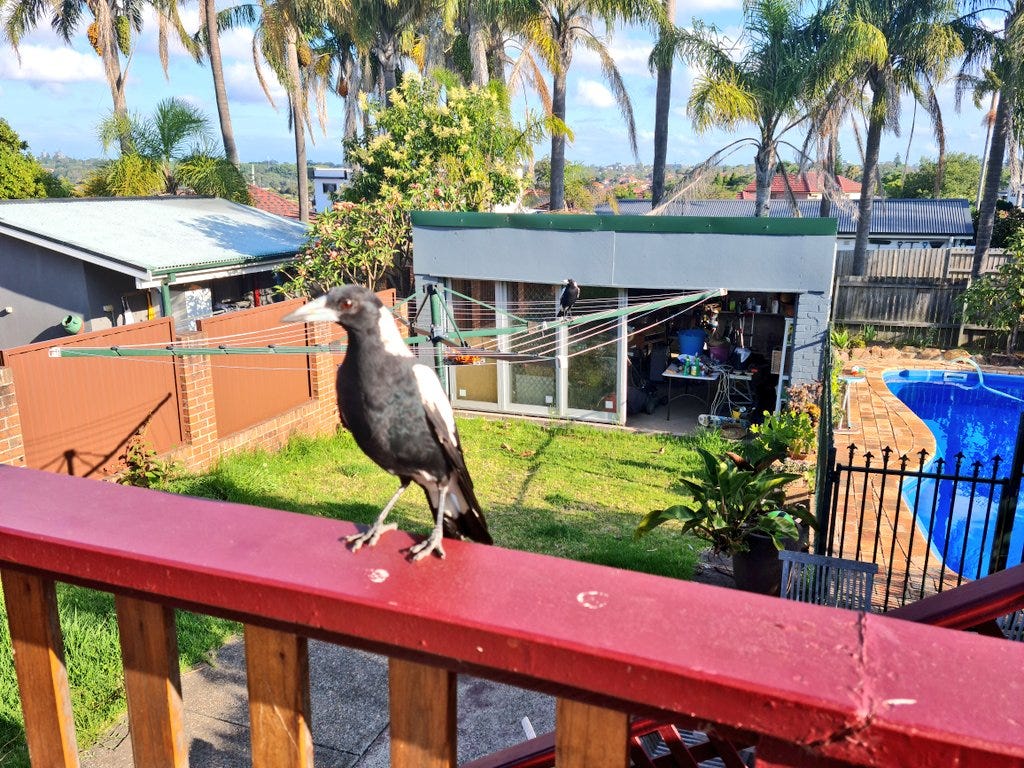The First Time Traveller
Sydney: An Unboxing
In Brad Wright’s Netflix series Travelers, humans from a post-apocalyptic future journey back in time to change the course of early twenty-first century history. They take over the bodies of people from our time at the moment of death. With only limited choice as to whose bodies to inhabit, they have to carry out their mission from within those hijacked bodies and borrowed lives.
I like to indulge the fantasy of being one of those travellers whenever I feel myself spiralling down into self-criticism or regret. How would I feel if I were a voyager from the future, suddenly transplanted into this body, today? Perhaps a tad disappointed to be a pot-bellied, unhappily single woman with thinning hair already in her early 50s and without real estate or savings—but mostly, I think, I would feel immensely lucky to be in the prosperous west, in the body of someone with no health problems or disabilities, without debts or crippling addictions, and with a love of reading and a body that can flow through vinyasas, hike indefatigably and corkscrew and glide its way through an Argentine tango. Considering all the bodies that exist on our planet, it is a privilege to pilot this one.
Visiting a new country can bring you closer to the sensation depicted in Travelers: of finding yourself magically transplanted into an unfamiliar new reality. It’s the negation of that old joke in which the newcomer asks, “How do I get to (say) Bodmin Moor?” and receives the answer, “Oooh, if I were going to Bodmin Moor, I wouldn’t start from here.” You can always start from here. When you’re in a fresh new place, at the topsy-turvy other side of the Earth, where the moon looms close overhead and unfamiliar stars speckle the warm January night, you, the first time traveller, can feel much like a first time traveller.
Even mundane details are a delight. Crossing the city by bus and train is an adventure. In London, most buses run their routes at 5–7 minute intervals. If you miss a bus, you simply wait at the stop for the next one. Here, there are myriad buses traversing very similar routes and each individual line operates on a sparse timetable. The local transport app Opal will provide an itinerary that works, depending on the exact time that you set out. If you miss one bus, you’ll need to work out a fresh journey, walk to a different bus stop and hop onto another route, with completely different connections and interchanges. On many trips, the time at interchanges is calculated precisely: you’ll be able to switch seamlessly from one bus to the next as long as you don’t waste any time dashing up and down the road, trying to locate the new bus stop. If you do miss your connection, you must consult the oracle in your pocket again, who will plan a fresh route. It’s a complex system, but it works and it feels symbolic. Again, wherever you are, you can always restart your journey from here.
Sydney feels like a plush modern city, like a southern hemisphere Los Angeles, in many respects, but everywhere there are clues that you are somewhere more exotic. I’m writing this from a balcony with a view of the shoreline of Botany Bay, where, to his delight, Joseph Banks discovered a riot of strange new plantlife. Now, a busy road runs alongside the strip of beach, whose population changes from kitesurfers to Muslim families with women splashing in the water in black burquinis to bounding dogs and their owners as you walk westwards along the beach. But it’s not LA: sulphur-crested cockatoos are raucous in the trees; lorikeets flash by, lime green from a distance, like our London parakeets, but then, as they pass, revealing vermillion and egg yolk-yellow breasts and cobalt heads; magpies come with colours reversed, white markings on black, in this upside-down place; and seagulls are decorous dainty little birds (unlike their British cousins, hefty, kleptomaniac thugs), perching alertly on the sand at precise, evenly spaced intervals, like stones on a Go board.
Nowhere has that feeling that this is a western city through a looking glass been clearer to me than in the Centennial Park: a large green round in the centre of the town. I entered through the wrought iron gates at the tail end of swanky Oxford St (which is nothing like London’s Oxford St—names of places here are disorienting in their odd familiarity—expecting only a normal city park: clumps of shade trees, extensive lawns, a couple of roads running through the centre, an ornamental pond or two. Instead, I discovered a magical world. The lawns were a-squawk and a-whistle with chalk-white corellas, plump parrots rooting around in the soil, many of them hurrying along the ground on squat little legs, in a kind of clumsy lurching run, like impatient toddlers. Then, as the light began to fade, the sky filled with what I at first thought must be birds, until—with a thrill—I spotted the scalloped wings and the torpedo shape of furry bodies tapering off into the bifurcations of tiny, matchstick-straight decorously parted little legs. The bats crossed the twilight sky in their thousands, in a seemingly never-ending stream, all travelling in the same direction—as if they were being puffed out in batches from a bat dispenser. I followed the source to a thicket of slender trees where the sky was so dense with bats that they almost formed a tent overhead and the dusk was filled with the rapid vibrato of a thousand high-pitched squeals. (I took a brief video, which you can find here.)
I have been lucky enough to have been gifted a luxurious three months to alternately work and explore here in Sydney and have barely unwrapped the cellophane from the packaging and peeled the plastic backing off the mirror with a careful fingernail. At fortnightly intervals, I plan to share my adventures with you (interspersed with essays on other topics). If you’re familiar with this place, do feel free to share your recommendations in the comments. Or tell me about your own favourite travel adventures.
In this fresh, young year of 2023, I’m happy to be here at the bottom of the world, upside down but not giddy. I’m happy to be starting from here.
(PS: As you may be able to tell, I’m not a highly skilled photographer, but if you would enjoy following my journey in pictures, you can find more on my Instagram.)






For so many years, I didn't want to be a writer. I avoided it and dismissed it when people told me I could write. The only times I didn't ignore it though? During my travels! What is it about being in unfamiliar territory that forces words out onto the page? I was looking recently for writing I did while working in Yemen, Senegal or Zambia years ago - though I fear it may be lost in old email accounts I don't know how to access. Never mind - there will always be more words and more places to visit. You've made me so excited for my own adventure in a few weeks: I'm going to be spending time in some of my favourite towns in Morocco, and hopefully writing from there.
This piece was really beautiful, you've painted a lovely picture of Sydney. I also love what you say about gratitude for finding yourself in this privileged body - I try to remind myself of the same whenever I get a bit overwhelmed or negative!
Oops! I forgot to mention, the bats fly from Lane Cove National Park each evening south to the Domain and Centennial Park. Many years ago, I lived in Neutral Bay with a fantastic harbour view. But the best part was watching the bats flying overhead each evening in their thousands, making their way to the Domain and Centennial Park.